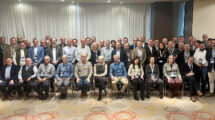Open science is a growing priority worldwide. Big societal challenges, as climate change and global pandemics are demonstrating the urgency of a shift towards cross-border and cross-disciplinary scientific collaboration and are boosting the adoption of open science practices.
Now more than ever the vision is gaining momentum, as UNESCO’s General Conference recently agreed on a first universal definition of Open Science and on international standards and recommendations. In short, Open Science is (finally) set to become the new normal.
How are NRENs contributing?
Research and Education Networks around the globe have an essential and increasingly important role in supporting Open Science. NRENs facilitate cooperation, enable research communities to organise, manage and share research data with their peers and with the wider scientific community. They provide services to store data such as SWITCHdrive or SURFdrive, or to transfer files such as FileSender. They also engage in procurement frameworks to help institutions take up commercial services, like e-Lab notebooks, CRIS systems or repositories.
Additionally, NRENs offer training and promote best practices within the community, helping researchers better understand FAIR principles and engage in Open Science activities.
To showcase examples of NRENs’ efforts in the field of Open Science, the GÉANT project’s User & Stakeholder Engagement team collected a series of case studies within the community and made them available on the GÉANT website. DeiC, SURF and HEAnet open the series by sharing their experiences across the research and education community in the first three case studies, intended to serve as a model for other NRENs.
Supporting the adoption of FAIR in Denmark
FAIR principles have gained significant traction in the drive to aid data discovery, sharing and reuse, but there are still many misconceptions about their implementation and low adoption within research communities.
DeiC set out to change this position with a programme of awareness-raising, training and support for Danish researchers. Results include a National strategy for FAIR research data management, case studies, training courses and webinars, FAIR myths postcards and the short educational story “A FAIRy Tale”.
Supporting research data management via compute services
Many researchers are unaware of data management requirements and services available to help meet these.
SURF is sharing information about data management and stimulating FAIR practice via its compute calls, raising awareness of funder requirements to manage and share the associated data, and highlighting tools available from SURF and universities to help.
Supporting Research Information Management systems in Ireland
Current Research Information Systems (CRIS) support research performing institutions in managing information on research to monitor grants, track outputs and identify research strengths.
As part of its remit, HEAnet’s Brokerage Team aggregates demand for these systems within its clients and runs procurements on their behalf. This resulted in HEAnet’s national cRIS procurement framework, helping their clients to obtain better terms and additionally saving time, effort and money.
Open Science is all about sharing
These first three case studies are a great start to the series, but we just started exploring the many success stories around Open Science in the Research and Education community. More are now in the making and will be released during 2022.
Would you like to tell us how your NREN is engaging in Open Science activities? Write to sarah.jones@geant.org
To read the new case studies and for all upcoming publications visit the resources section on the GÉANT website: https://www.geant.org/resources/#open_science







